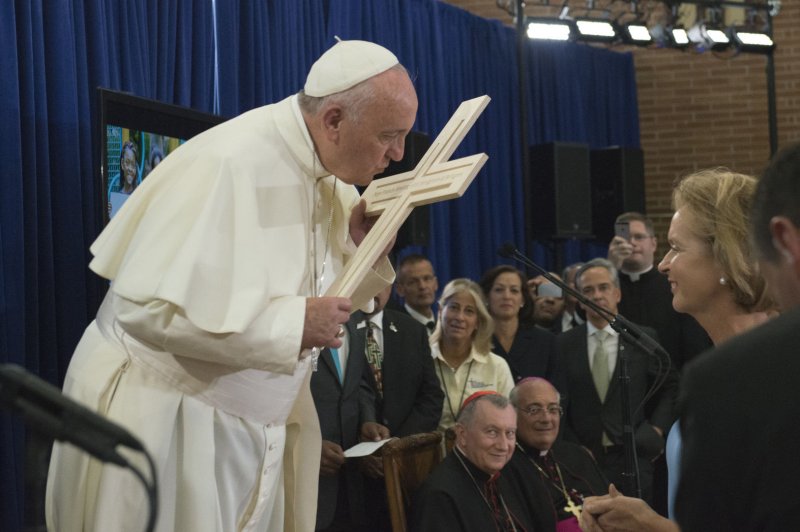Pope Francis kisses a cross presented to him as a gift inside of Our Lady Queen of Angels School in East Harlem in New York on Sept. 25. A small but growing number of Americans, particularly among the millennial generation, are shunning church and organized religion for spiritual peace and well-being, a new study found. Pool Photo by Stephanie Keith/UPI |
License Photo
WASHINGTON, Nov. 3 (UPI) -- A small but growing number of Americans, particularly among the millennial generation, are shunning church and organized religion for spiritual peace and well-being, a new study found.
The Pew Research Center study found 46 percent of American adults feel a deep sense of wonder about the universe on a weekly basis, up 7 percentage points from 2007, when a comparable study was completed. About 6 in 10 adults feel a deep sense of spiritual peace and well-being at least once a week, also up 7 points from 2007.
At the same time, the study found the share of adults in the United States who say they believe in God has declined from 92 percent to 89 percent since the 2007 study. The share of U.S. adults who are "absolutely certain" God exists has dropped from 71 percent in 2007 to 63 percent in 2014.
Overall, those who consider themselves the "nones," with no religious affiliation account for 23 percent of the adult population, up from 16 percent in 2007, the survey of 35,000 adults found.
"The fall-off in traditional religious beliefs and practices coincides with changes in the religious composition of the U.S. public," researchers found. "A growing share of Americans are religiously unaffiliated, including some who self-identify as atheists or agnostics, as well as many who describe their religion as "nothing in particular."
Other findings include:
The religious "nones" are not necessarily nonbelievers. Instead, they are far less religiously observant than Americans who identify with a specific faith. "The growth of the 'nones' as a share of the population, coupled with their declining levels of religious observance, is tugging down the nation's overall rates of religious belief and practice," researchers found.
Within the Democratic Party, religious "nones" outpace Catholics and Protestants. Fewer than two-thirds of Democrats identify with any branch of Christianity, down 11 percent since the 2007 study.
In the Republican party, the "nones" are growing, as well, but at a slower rate. Some 14 percent of Republicans now say they have no religious affiliation, up from 10 percent in 2007.
Nearly all major religious groups have become more accepting of homosexuality, including those that traditionally have expressed strong opposition to same-sex marriage.
"Changing attitudes about homosexuality are linked to the same generational forces helping to reshape religious identity and practice in the United States, with millennials expressing far more acceptance of homosexuality than older adults do," researchers said.















